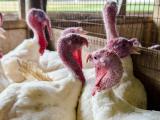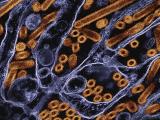Mar 11, 2005 (CIDRAP News) – The recent series of cases of avian influenza in a single province in Vietnam has increased concern about whether the nature of the illness is changing.
At least eight people from the northern province of Thai Binh have tested positive for H5N1 flu since this outbreak began in December 2004, according to Agence France-Presse (AFP), and two have died. Overall, 25 laboratory-confirmed cases, 14 of them fatal, have occurred in Vietnam and Cambodia since mid-December 2004, the World Health Organization (WHO) said today in an update on the case count.
The Thai Binh cases include two people who tested positive for avian flu despite having no symptoms. Both have family members who contracted avian flu.
"It's too early to say whether these cases are any different from previous cases or not," said Dr. Peter Horby, a WHO epidemiologist in Hanoi, in an Associated Press (AP) story yesterday. Referring to the asymptomatic cases, he added: "The two people with atypical infections could be related to improved testing, or it could relate to some difference in the virus. We won't know till we isolate the virus. It's too early to be raising alarms."
A local health official told AFP that people in Thai Binh need more information.
"What worries us most is that people don't have enough information on bird flu transmission and on poultry-raising," Dang Duc Rieu, director of the provincial animal health department, said in an AFP report on Mar 9.
He said local people, including local authorities, are very worried because more human cases of avian flu have occurred this year even as the toll on poultry has been lower than last year. "We are closely monitoring the infected people and places where the poultry outbreaks were reported," he said.
In the Thai Binh village of Thuy Luong, Le Thi Nhuan told AFP that people are avoiding her and her family members because three of them had avian flu. Her father-in-law is the 80-year-old man with confirmed H5N1 but no symptoms. The health department was to have given her family members masks, but hadn't yet done so, she said.
"Ever since they were discovered to be infected, villagers don't want to stay close to us," she said.
In today's update, the WHO said the Vietnam Ministry of Health has confirmed 10 human cases of H5N1 avian flu, of which 3 were fatal. Some of the cases were detected this month, while others date back to late January, the WHO said. Today marked the first update of the WHO's case counts since early February.
"This notification of cases follows new reporting procedures established within the Ministry of Health in collaboration with WHO staff in Hanoi," the WHO said.
Overall, the WHO has logged 69 human cases, including 46 deaths, since January 2004. Those include 51 cases and 33 deaths in Vietnam, 17 cases with 12 deaths in Thailand, and one fatal case in Cambodia.
The statement said cases have occurred in three phases: from January through March 2004 (35 cases, 24 deaths), from August through October 2004 (9 cases, 8 deaths), and December 2004 to the present (25 cases, 14 deaths).
On the prevention front, authorities in three countries have announced new plans to stem the advance of avian flu in poultry as well as people.
Vietnam's Institute for Veterinary Research will vaccinate ducks in the southern Mekong Delta region in April, using vaccines imported from China and the Netherlands, China's Xinhua news service reported yesterday.
Hong Kong announced a plan to increase oseltamivir supplies more than five-fold, spending $33.1 million (US) on a stockpile big enough for roughly 1 million people, according to a Xinhua story yesterday. An amended flu preparation plan calls for more than 20.5 million doses to be stockpiled over the next 12 months.
Other countries, including France, Britain, New Zealand, Sweden, Canada, and the United States, have also announced plans to order the same drug, Reuters news service reported today.
In Thailand, authorities have already begun stockpiling oseltamivir, an antiviral treatment thought to reduce the severity of H5N1 flu in people, Reuters reported. However, the cost of purchasing oseltamivir from Swiss drug maker Roche is prompting Thailand to contemplate making its own supply.
"Hopefully, if the active ingredient which we are importing from India proves to be good quality, we will be able to produce the drug in an emergency case in six months," Suwit Wibulpolprasert, a senior advisor on health economics at the Thai Healthy Ministry, told Reuters.
A Thai doctor with the WHO office in Bangkok told Reuters that the challenge of delivering the drug within 48 hours of illness is daunting in countries such as Cambodia and Vietnam because of a lack of awareness or sophisticated disease surveillance.
Oseltamivir is less effective if initiated more than 48 hours into the illness, said Dr. Somchai Peerapakorn. "It's still not a very good tool, but it's the only tool."
See also:
Mar 11 WHO statement
http://www.who.int/csr/don/2005_03_11/en/


















